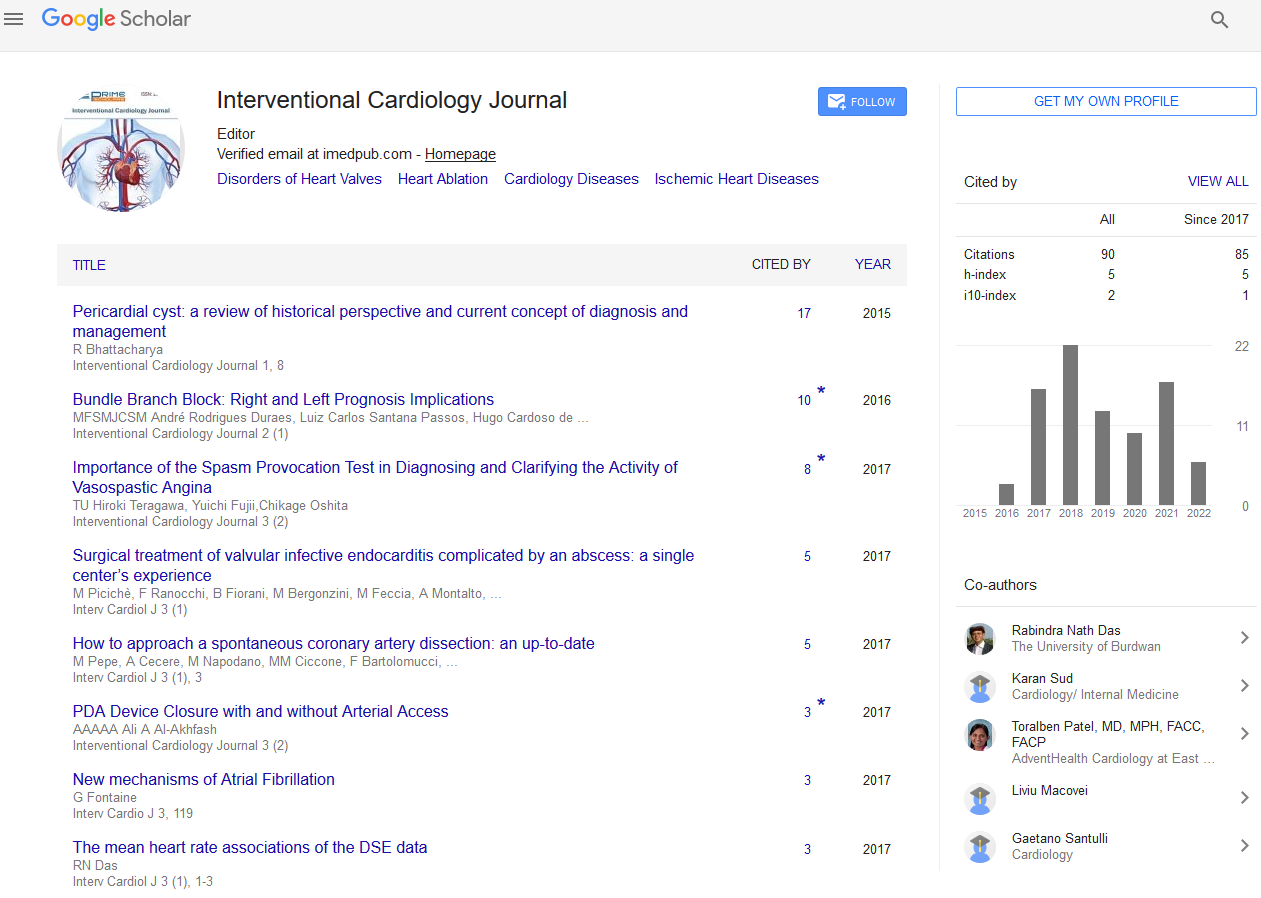Short Communication - (2023) Volume 9, Issue 6
Prosperity threats impact on myocardial localized necrosis
Elijah Morgan*
Department of Nutrition, Sun Yat-sen University, China
*Correspondence:
Elijah Morgan,
Department of Nutrition, Sun Yat-sen University,
China,
Email:
Received: 31-May-2023, Manuscript No. IPIC-23-17539;
Editor assigned: 02-Jun-2023, Pre QC No. IPIC-23-17539 (PQ);
Reviewed: 16-Jun-2023, QC No. IPIC-23-17539;
Revised: 21-Jun-2023, Manuscript No. IPIC-23-17539 (R);
Published:
28-Jun-2023, DOI: 10.21767/2471-8157.9.6.52
Introduction
Obesity is a complex condition linked to various health risks, including
myocardial infarction. Excess body weight contributes
to the development of hypertension, diabetes, and dyslipidemia,
creating a perfect storm for heart disease. Fat tissue also
releases inflammatory substances that can damage blood vessels,
increasing the likelihood of plaque formation and rupture.
A family history of heart disease, particularly myocardial infarction,
can increase an individual's susceptibility to the condition.
Genetic factors play a role in how the body metabolizes cholesterol,
responds to inflammation, and processes blood clotting.
These genetic predispositions can amplify the impact of
lifestyle factors, compounding the risk of heart attack. Chronic
stress, anxiety, and depression can take a toll on cardiovascular
health. Stress hormones can elevate blood pressure, promote
inflammation, and contribute to the development of atherosclerosis.
Unhealthy coping mechanisms, such as overeating or
smoking, can further compound the risk of myocardial infarction.
Advancing age is a non-modifiable risk factor for myocardial
infarction. As individuals grow older, the arteries naturally
become less flexible and more prone to plaque formation [1,2].
Men generally face a higher risk of heart attack, although the
risk for women increases after menopause due to hormonal
changes. Some arrhythmias are benign, but others can be
life-threatening and require medical management.
Description
Survivors may experience a diminished quality of life due to
ongoing physical limitations, medication side effects, and emotional
distress. Engaging in a heart-healthy lifestyle and seeking
psychological support can help mitigate these challenges. Some
studies suggest that myocardial infarction survivors might experience
cognitive decline, particularly in areas such as memory
and executive function. However, more research is needed
to fully understand this connection. Long-term management
is crucial for preventing future cardiac events. Lifestyle modifications,
including adopting a heart-healthy diet, regular exercise,
stress reduction, and smoking cessation, are essential
components of secondary prevention. The effects of myocardial
infarction ripple beyond the survivor, affecting caregivers,
family members, and loved ones. Caregivers often experience
emotional strain, anxiety, and a sense of responsibility for the
survivor's well-being. Balancing caregiving with personal and
professional responsibilities can lead to burnout. Support
groups, counseling, and education about the recovery process
can help caregivers cope with their roles effectively. Cardiac rehabilitation
is a structured program that encompasses exercise,
education, and counseling to support patients in their recovery
after a heart attack [3,4]. Supervised exercise programs help
patients regain strength, endurance, and confidence in their
physical abilities. Patients learn about proper nutrition, stress
management, medication adherence, and smoking cessation
to reduce risk factors.
Conclusion
Rehabilitation programs address the psychological impact of
a heart attack, helping patients cope with anxiety, depression,
and fear. A diet rich in fruits, vegetables, whole grains, lean protein,
and healthy fats can help control blood pressure, cholesterol
levels, and weight. Regular exercise improves cardiovascular
fitness, maintains a healthy weight, and enhances overall
well-being. Quitting smoking significantly reduces the risk
of further heart events and enhances overall lung and heart
health. Learning stress-reduction techniques such as meditation,
yoga, and deep breathing can help lower blood pressure
and promote emotional well-being. Myocardial infarction
treatment has come a long way, offering a spectrum of options
that cater to the diverse needs of patients.
Acknowledgement
None.
Conflict Of Interest
The author’s declared that they have no conflict of interest.
References
- Varbo A, Benn M, Nordestgaard BG (2014) Remnant cholesterol as a cause of ischemic heart disease: Evidence, definition, measurement, atherogenicity, high risk patients, and present and future treatment. Pharmacol Ther 141(3):358-367.
[Crossref] [Google Scholar] [PubMed]
- Doi T, Langsted A, Nordestgaard BG (2022) Elevated remnant cholesterol reclassifies risk of ischemic heart disease and myocardial infarction. J Am Coll Cardiol 79(24):2383-2397.
[Crossref] [Google Scholar] [PubMed]
- Zafrir B, Jubran A, Hijazi R, Shapira C (2018) Clinical features and outcomes of severe, very severe, and extreme hypertriglyceridemia in a regional health service. J Clin Lipidol 12(4):928-936.
[Crossref] [Google Scholar] [PubMed]
- Langsted A, Nordestgaard BG (2019) Nonfasting versus fasting lipid profile for cardiovascular risk prediction. Pathology 51(2):131-141.
[Crossref] [Google Scholar] [PubMed]
Citation: Morgan E (2023) Prosperity ThreatsImpact on Myocardial Localized Necrosis. Interv Cardiol J. 9:52.
Copyright: © 2023 Morgan E. This is an open-access article distributed under the terms of the Creative Commons Attribution License, which permits unrestricted use, distribution, and reproduction in any medium, provided the original author and source are credited.

